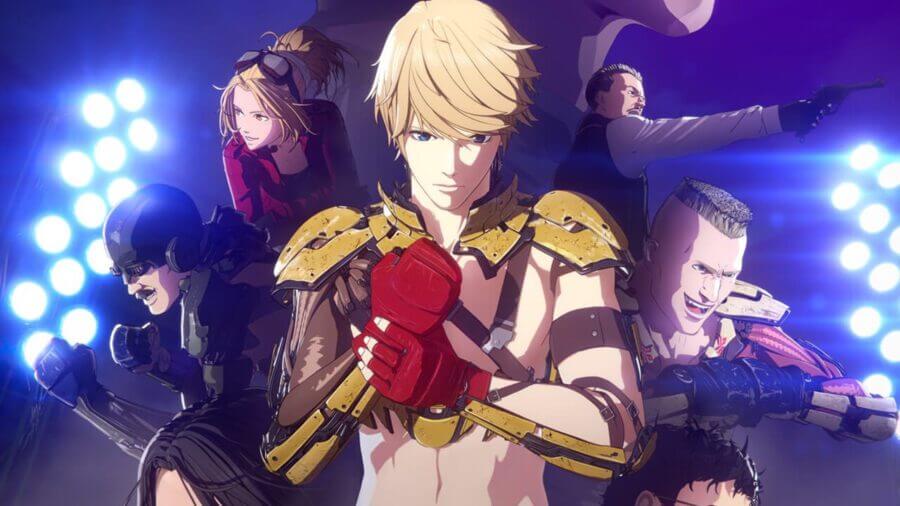Levius
September 8, 2023 · 0 comments
By Andrew Osmond.

In Levius, boxing meets steampunk; or to put it in anime terms, Megalobox (or Tomorrow’s Joe) meets Fullmetal Alchmist (or Violet Evergarden). It’s a series by the Polygon CG studio, which many readers will know for its space opera, Knights of Sidonia. Like that series, Levius was produced by Netflix and first screened on the platform. But it’s a big change of scene from Sidonia.
Instead of starfields and spaceships, the setting looks decidedly British. The hero’s city has rows of terraced brick houses that could have come from the titles of Coronation Street, or from the early scenes of Steamboy, the exuberant anime movie by Katsuhiro Otomo. Our hero’s called Levius, which doesn’t sound like a common British name, but when his family name is Cromwell, it balances out. We jump in with Levius in the ring, powered by both muscles and mechanics. One of his arms is a prosthetic, and both arms are augmented with metal gears. But it’s no freakshow. His opponent is just the same, in this newly-established sport of “metal boxing.”
Much of the backstory gets explained in parts two and three. Levius’ country has recently suffered a war, in which his father perished. Worse still, the war came to the city, catching up Levius, then a child, and his mother. That’s when Levius lost his arm, incinerated by an enemy war-machine. His mother protected the boy, but was left in a seemingly permanent coma. Levius was taken in by his grandmother and his uncle Zacks – the latter a former boxer, gruff but with warmth beneath. He’s voiced in Japanese by Junichi Sawabe, who took the title role in Space Dandy.

It’s Hugo who sees the boy’s talent, and trains him up to be the rising star we see in part one. Why Levius wants to fight is something even he can’t articulate, though it’s plainly bound up with his war trauma. More straightforward is Natalia, an impetuous girl fighter who was shocked to be beaten by Levius. Now she insists on sparring with him in his “gym” (a disused factory building), looking for an edge. Her pride contrasts with Levius’ lack of ego – when Natalia does best him in the ring, his response is to ask her enthusiastically to teach him. Natalia’s Japanese actress is Ayane Sakura, who voices the similarly hotheaded Mika in the Psycho-Pass franchise.
It turns out “metal boxing” isn’t just about gears and robotics. In this world, a new miracle substance was discovered – a common plot device in SF alternate histories, as with the Icelandic water in Steamboy that brings a new age of steam power. In Levius, the secret is again found in water that can bind with blood and produce steam. In the show’s world, this led to the production of human-machine cyborgs powered by that steam. The water once caused the war which shattered Levius’ life. Now it’s led to a bread-and-circus sport for the masses, in a show where the boxing ring is a Roman-style Colosseum, and where Levius is compelled by his demons to fight again and again.
Andrew Osmond is the author of 100 Animated Feature Films. Levius is released in the UK by Anime Limited.
Leave a Reply